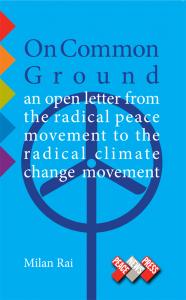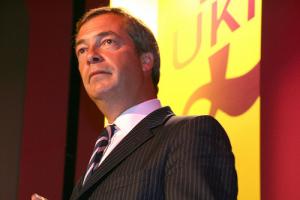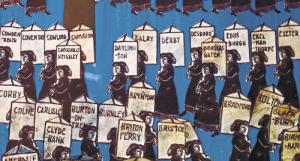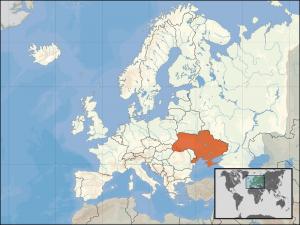Noam Chomsky once observed that the dirty little secret of ‘national security policy’ is that ‘security is at most a marginal concern of security planners’. He was speaking of the United States, but the lesson generalises, certainly to the UK.
We can see this in the reaction to the ‘Islamic State’ terror attacks in Paris in November, which killed 130 people.
Policymakers in Britain, France and elsewhere are knowingly increasing the power of IS recruiters and commanders…
Editorial
On Saturday 12 September, we had a wonderful ideas day in London with 18 PN workers, readers and supporters, thinking about how Peace News can develop and grow and become more useful to the cause of nonviolence and to grassroots movements struggling for radical social change.
More power than we know
One of the interesting moments came at the beginning of the day, when we considered the question ‘When have I felt powerful?’ The answers to this were meant…
How can we create a genuinely common agenda for the climate movement and the disarmament movement? It’s easy – and still important – to say that the money we spend on nuclear weapons could be spent on preventing climate change, but there must be more than that.
For us in the peace movement, it can be hard sometimes to see that climate change is already a reality today, it’s not just about what might happen two generations from now. We’re already seeing the impact of climate change…
There is something hopeful about the rise of UKIP (UK Independence Party). Yes, it is a racist far-right party; yes, the mainstream parties have responded to its increasing strength by becoming more repressive and racist; and yes, it may win several seats in the general election in May 2015 – all frightening developments.
On the other hand, UKIP is part of a global anti-establishment phenomenon which in Europe is represented not only by far-right parties like Golden Dawn in Greece…
Have you ever been in this situation?
You’re in a grassroots, very-low budget campaigning group. You have a group website.
Then the person who set the website up – and who has been maintaining it – moves away, or they move onto another issue, or they withdraw from activism completely.
Suddenly, you find out no one knows what the passwords are, and you can’t actually use your own website. Or, if you do know what the passwords are, no one else in the group is…
The British view of the world, even today, is fundamentally shaped by a 100-year-old lie, a powerful myth that contrasts German aggressiveness with the US-UK defence of small countries and high principles. In reality, it is a documented fact that the sovereignty of ‘plucky little Belgium’ was irrelevant to Britain’s decision to enter the First World War. In reality, it is a documented fact that the military alliances that Britain entered into were born of a desperate need to shore up…
In Marge Piercy’s wonderful visionary work, Woman on the Edge of Time (1985), a young visitor from a future North American utopia wants to see a car. Dawn says: ‘I studied about them. I saw them on holi. How the whole society was built around them, they paved over the earth for them to run on and sit on right in the middle of where they lived! Everyone had to have one. And they all set out in their private autocar to go someplace at the same time and got stuck in jams and breathed…
Nuclear promises
It is difficult to see the Crimea crisis clearly through the choking fog of western hypocrisy that surrounds it. Before trying to do so, there is one factor that we should deal with straightforwardly. When Ukraine became independent (after the collapse of the Soviet Union in 1991), it inherited 1,900 strategic nuclear warheads, more nuclear weapons than China, France and Britain held…
We are shocked at the current US campaign to rob a future Palestinian state of viability and genuine independence (see the front page interview with Norman Finkelstein).
The best case scenario in the foreseeable future for both Palestine and Israel is an authentic two-state solution which allows a Palestinian state on the 1967 ‘green line’ borders, meaning the West Bank , East Jerusalem and the Gaza Strip. This means the evacuation of illegal Israeli settlements on the West Bank (…
It’s still unbelievable that he has gone. Howard Clark has been a key figure in Peace News for several decades – as a co-editor, collaborator, contributor, (re-)organiser, trustee, director, defender. His 1971 essay Making Nonviolent Revolution, which we re-published as a pamphlet two years ago – over his modest objections – with a new, very valuable afterword by Howard, remains one of the most important explanations published of the liberatory politics that PN aims to…
We remember the lunch counter sit-ins that electrified the civil rights movement in the US in 1960. We remember the dignity and persistence of the hundreds of young African-American who asserted their right to be served as equals, day after day, despite repeated beatings and arrests.
The direct action of these Black students achieved desegregation of many businesses within weeks, and dramatically escalated the confrontation with institutional white racism. Many of the students…
We are of the generation who came of age in the 1980s, terrified that the world might end at any moment through nuclear holocaust. In the decades since then, the people of the world have grown less frightened of a nuclear war.
The risk is still there, as the number of nuclear weapon states increases, and conflicts continue around nuclear tinderboxes, but the fear has declined.
Recent studies suggest that even a ‘small’ nuclear war between India and Pakistan, with each…
When I gave birth to my child, there he was, he was a boy! So different from me. If he had been a girl, I would have looked ahead at his childhood through the template of my own. I remember thinking: ‘Oh no, I don’t like football, I’ll need to get to grips with boys’ interests and needs’. I nevertheless gave him my dolls’ house furniture and found that he was his own person, didn’t like football anyway, and we did pretty well on gender, power and politics over the next 18 years.
But…
It is a famous, but apocryphal exchange: ‘Mr Gandhi, what do you think of western civilisation?’ ‘I think it would be a very good idea.’ Europeans like to see their culture as springing directly from the fountains of Greek creativity, being refined within the formality of the Roman empire, then surviving ‘the dark ages’ to flower in the Renaissance and all that has followed.
The Irish journalist and UN civil servant Erskine Barton Childers wrote a passionate corrective in 1966: ‘I…
The courageous Israeli Jewish journalist Amira Hass recently condemned the phrase ‘nonviolent resistance’ in relation to the Palestinian struggle against Israeli occupation. This caused some jubilation among activists concerned with Palestine who are hostile to nonviolence.
Their jubilation may have been premature.
Amira Hass said, in her interview with US radical news programme, Democracy Now!, ‘I don’t like the term “nonviolent resistance”…. because it puts the onus of being…






